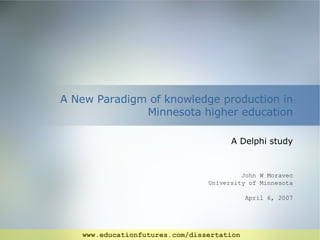A New Paradigm of knowledge production in Minnesota higher education
The document summarizes the findings of a Delphi study on the potential futures of higher education in Minnesota given trends of globalization, the rise of the knowledge society, and accelerating change. The study identified 24 statements on potential futures through an environmental scan. It then conducted 3 rounds of questionnaires with university leaders to build consensus on the statements. The implications for higher education leadership were categorized into 10 themes: accountability, knowledge production, curricula, collaboration, external relations, faculty relations, structural realignment, funding/resources, students, and technology leadership. The researcher proposes further solidifying findings, exploring accelerating change's impact in more detail, broadening the scope, and reiterating the Delphi process to achieve consensus.

Recomendados
Recomendados
Más contenido relacionado
La actualidad más candente
La actualidad más candente (20)
Similar a A New Paradigm of knowledge production in Minnesota higher education
Similar a A New Paradigm of knowledge production in Minnesota higher education (20)
Más de John Moravec
Más de John Moravec (20)
A New Paradigm of knowledge production in Minnesota higher education
- 1. A New Paradigm of knowledge production in Minnesota higher education A Delphi study John W Moravec University of Minnesota April 6, 2007 www.educationfutures.com/dissertation
- 3. New Paradigm model Globalization Knowledge Society Accelerating Change New Paradigm
- 10. Accelerating change Time Level of Advancement J
- 11. A New Paradigm Note. Old paradigm and emergent paradigm domains, from fundamental relationships to reality , adapted from Schwartz, P., & Ogilvy, J. A. (1979). The emergent paradigm: Changing patterns of thought and belief . SRI International. Globalized Globalizing Local Place Contextual Perspectival Objective Reality Creative destruction Morphogenic Assembly Change process Anticausal Mutual Linear Causality Design Indeterminate Deterministic Worldview Synergetic Holographic Mechanical Relationships of parts Intentional, self-organizing Heterarchic Hierarchic Conceptualization of order Complex creative (teleological) Complex Simple Fundamental relationships New Emergent Old Domain Paradigm
- 14. Three phases of research Delphi round 1 : First ranking, Identify new items Delphi round 2 : Second ranking (rank all items + any new items) No: Repeat Round 2 as necessary Did group reach con-sensus? Environmental scan/Literature review : Identify items for Delphi rounds Analyze and report findings Phase I Phase II Phase III Collect final round data Yes
- 18. Analysis and reporting process flow – third round data Note. Adapted from figure 11.1 in Berg, B. L. (2004). Qualitative research methods for the social sciences (5th ed., p. 286). Boston: Pearson. Revise, if necessary Determine sociological constructs for analysis Open coding of data to establish grounded categories Sort data into categories Report and discuss findings Determine criteria of selection for sorting data chunks into the analytic and grounded categories
